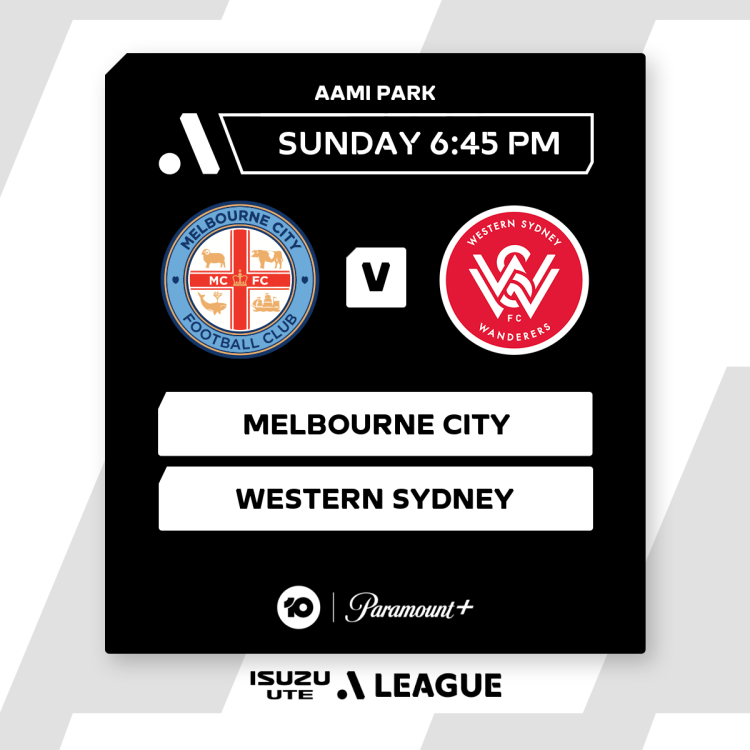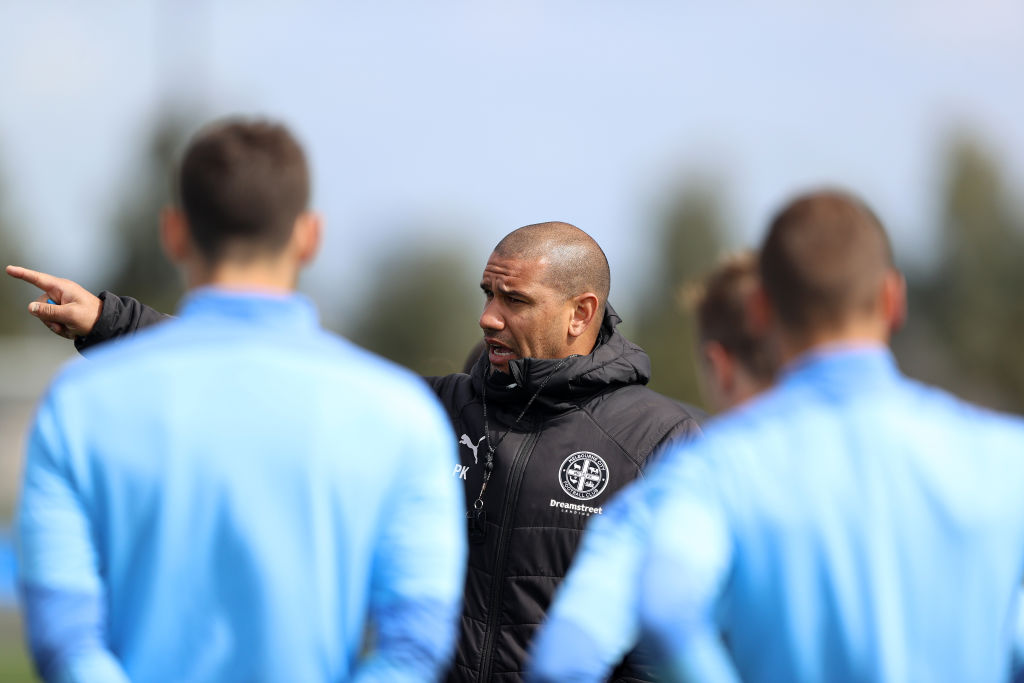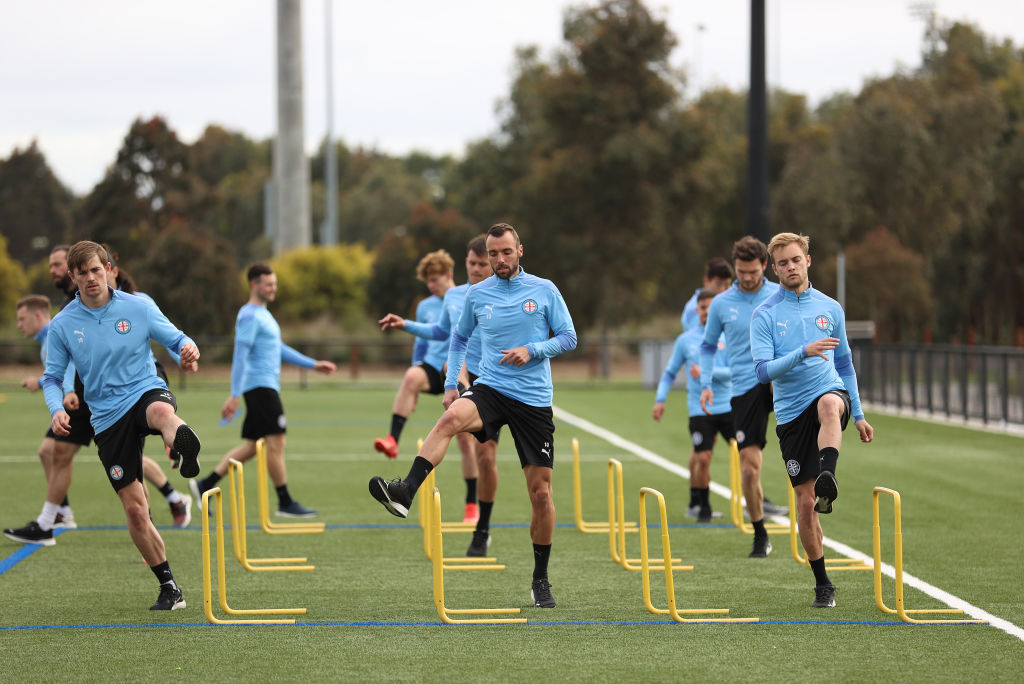The A-League champions face a crucial game on Sunday, but off the field are finding their feet in South-East Melbourne, finds Joey Lynch.
In the end, the headlines were dominated by a 19-year-old goalkeeper’s saves in the penalty shootout that knocked the A-League champions out of the FFA Cup.
And yet, for all the grim looks on Melbourne City faces in the wake of Wednesday’s loss to Wellington, there was also a sense that a short-term loss may be part of a long-term win.
For head coach Patrick Kisnorbo, the only focus is a potentially determinative period for Melbourne City’s men’s team – last year’s title winners able to move within a game of the table’s summit by beating Western Sydney at AAMI Park on Sunday, or slip deeper into the chasing pack with a defeat.

Yet off the field, developments are gathering pace to build the club’s identity and geographic basis, despite the hamperings of a pandemic.
Just over a year on from the club announcing that it was relocating its operations to Melbourne’s southeast and just over six months on from announcing the construction of a new home in Casey, City finally got the chance to host a competitive men’s fixture in its new stomping grounds on Wednesday evening – only for Wellington Phoenix to spoil the party with their against-the-odds triumph.

Of course, the prevailing circumstances meant that it wasn’t as shocking an upset as it could have been: on Tuesday, coach Patrick Kisnorbo revealed that all but five members of his squad had tested positive for COVID since his side was in action 17-days prior. Those diagnoses had forced the initial postponement of the Cup clash with the Nix at Casey Fields and their New Year’s Day A-League Men clash with Newcastle Jets in the Hunter.
While 1,485 fans were able to redeem tickets to attend Kingston Heath Soccer Complex, the original postponement, change in venue and limited tickets on offer meant that this number was well down on the anticipated five to seven thousand people that were expected to attend the originally scheduled contest at Casey Fields.
Nonetheless, despite its less than auspicious ending, the evening – City’s men now joining its women’s and youth sides in staging competitive fixtures in the region – represented another important landmark in the club’s journey towards what they hope will one day see them widely acknowledged as the team of Melbourne’s southeast.

After spending years in the wilderness as the perennial chokers of A-League Men – one big moment away from “Hearting it” – City has transformed its senior side into perennial heavyweights in recent years; combining a cohort of young homegrown talent with shrewdly recruited veterans to reach two straight grand finals and secure a premiership and championship double in 2020-21.
Yet whereas City has arguably become the model team in the competition, the longer-term project is to build an off-field surge in support for them as a club.
The move to Melbourne’s southeast, a region disproportionately represented in the club’s membership numbers and which is highly multicultural and football-focused, is supposed to go some way towards addressing this. And while numerous lockdowns and strict COVID protocols at the club have somewhat hampered its ability to truly immerse itself to this point, City CEO Brad Rowse is encouraged by the early signs.
“It’s been fantastic, really good,” the executive told KEEPUP. “The facilities are absolutely wonderful. We’re only about to start the phase two construction for our elite facilities but the temporary facilities that we have are arguably as good as anything in the A-leagues.
“Casey Council has been incredible in terms of the pitch quality. It’s almost faultless.
“The big thing for me is that the community have been fantastic. The enthusiasm and the amount of kids… one of the great things at Casey is that we’re surrounded by thousands of houses and we’re right in the middle of a community. Kids and families can come and watch training and we’ve never had that before.
“We’re really right in the thick of a community and I think that’s really important for sport and for football.”
This close proximity to the local community has allowed, when COVID hasn’t forced the club to retreat into a self-imposed bio bubble in an effort to prevent infections amongst its staff and playing group, for members of the City squad and coaching staff to engage in their own efforts to win hearts and minds.
“You always need to give back to the community and the sport,” City coach Patrick Kisnorbo said.
“Down here we have a lot of kids that come and play on the local pitches, which is fantastic to see. Going out of my way [to talk with them] is nothing because I remember I was one of those kids with a dream.
“It’s great to have that sort of connection with the community. There’s a lot of people that come to training and play, boys and girls, from different backgrounds. It’s great, the diversity is fantastic.
“Me having a kick – not me having a kick, more me saying hello because of my achilles – but it’s great to have some friendly banter with them and I enjoy watching them have a kick. It’s fun, it’s good to see.”
One of the significant drivers of City’s efforts to integrate itself with the local tribes of the region has been the work of the ‘Team City’ unit, fronted by former Herald Sun sports journalist and southeast Melbourne resident Matt Windley.
Formerly behind the Team 11 bid to bring an expansion franchise to Melbourne’s southeast – which put community buy-in and local club involvement at its core – the focus has now shifted to using those existing connections to support City’s move to the area and increase opportunities for locals to experience professional sport on their doorstep.
Their efforts, putting in numerous calls to rally the locals to the flag, was a significant driver behind the thousands expected at Casey Fields before the postponement.
For Rowse, the work is supplementing a long-term vision for the club in the area, one that will only improve in the years ahead.
“It’s been so disruptive with COVID, so there’s a lot of things that we wanted to do to engage with kids and our City in the Community Program and our football schools – all those things have been shelved and put on ice for a little bit,” said Rowse.
“But it takes time as well. We don’t expect things to happen overnight. We’ve only been there a little while. We’ve got to earn our respect locally and do the right thing and that’s something that takes not weeks or months but years.
“But we’ve got a long-term plan to make sure we’re integrating at all levels with local junior clubs, helping to identify young talent and create pathways and to have a presence and engage with as many sections of the community as we can.”
But that’s in the long-term and, for now, City the A-League Men side have more pressing concerns to contend with.
Even discounting the disappointment of seeing his side’s FFA Cup run come to an end, having his COVID-ravaged and out-of-condition squad go 120 minutes in their return to action represents a far from ideal situation for Kisnorbo; especially with the Wanderers now awaiting them on Sunday evening.
Scheduled in the wake of both club’s original opponents being waylaid by COVID factors, a third win for the season on Sunday would see the Citizens use their game in hand to move within two points of league-leading Melbourne Victory – as well as heaping further pressure on Wanderers’ boss Carl Robinson.
Defeat, however, would see the defending champions fall further into the crowded pack battling it out in the lower half of the finals places as a bit of a gap, potentially began to form between themselves and pacesetters Victory and Macarthur.
“We just have to prepare the best we can,” Kisnorbo said on Wednesday night. “There will be a lot of recovery. We’ve already started working on the video for the game. It’ll just be normal, we’ve just got less break than anything else.”





